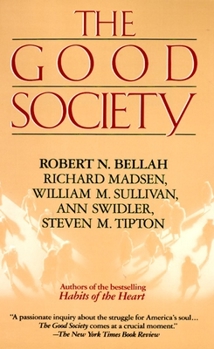Good Society
Select Format
Select Condition 
Book Overview
THE GOOD SOCIETY examines how many of our institutions- from the family to the government itself- fell from grace, and offers concrete proposals for revitalizing them.
Format:Paperback
Language:English
ISBN:0679733590
ISBN13:9780679733591
Release Date:August 1992
Publisher:Vintage
Length:368 Pages
Weight:0.74 lbs.
Dimensions:0.8" x 5.2" x 8.0"
Customer Reviews
4 ratings
a classic that still deserves its classic status
Published by Thriftbooks.com User , 17 years ago
This book remains a classic, for good reason; it's Sociology at its best, and writing at its most lucid, interesting and significant.
They won't reach a wide audience
Published by Thriftbooks.com User , 21 years ago
"The Good Society" is a thick book brought to us from the same people who wrote "Habits of the Heart." I never read that book, but if it is anything like "The Good Society," I think I will take a pass on it. Maybe my slightly negative opinion of this book is due to the fact that it was required reading for a class. Assigned reading often leads to disappointment and disillusionment. I avoided reading literature for years because of the Gestapo-like tactics of high school English teachers. What is surprising is that this book covers topics I am usually interested in learning about. I guess we can't win them all.The main thesis of "The Good Society" is simple: we, meaning American society, are no longer in control of our institutions. The authors define institutions in a broad sweep, encompassing economic, political, religious, educational, law, and international organizations and bodies (while curiously ignoring the media, the most egregious institution of them all because they help prop up all of the other ones). Only by regaining control over institutions, by making them responsive to democratic ideals, can we achieve what the authors refer to as a "good society." An introductory chapter introduces the reader to several individuals involved in daily life, from a woman working for a company facing a merger to a couple attempting to help the poor in an underdeveloped urban area to an economist forced to make cost-benefit analyses with people's lives. Each of these people understands there is something wrong with the way they do things and the results of their actions. The authors point out that this is because people no longer challenge, let alone recognize, the underlying institutions responsible for our lives. For example, the woman facing problems from the company merger does not think to question the underlying economic system that reduces her to a mere number on a piece of paper. In short, people consider institutions as fixed, permanent entities impervious to change.Central to this theme of institutional chaos is an examination of John Locke's belief in the rugged individual determining his own future in the social and economic realm. The authors argue that this old belief is no longer valid in today's world even though people still cling to those ideas. Through an examination of the economic history of the United States, "The Good Society" shows how the emergence of huge capitalist enterprises at the end of the 19th century effectively blunted any hopes that an individual could control his destiny. Even more dangerous to the Lockean ideal as it appears in the modern consciousness is the realization that corporations are not subject to democratic restrictions. Unfortunately, many institutions imitate or act as a support system (again, the media being the most rabid supporter) to corporations in today's society, with a concomitant resiliency to the type of public responsibility required in a healthy democratic state.All of this high falutin' t
Individuals and Institutions
Published by Thriftbooks.com User , 24 years ago
This book by Robert Bellah and his colleagues elaborates upon the need for re-thinking the relationships between individuals and social institutions. Each of the major topical chapters includes an historical overview and practical suggestions for institutional change.
An excellent visioning and follow-up to Habits of the Heart
Published by Thriftbooks.com User , 25 years ago
This book is required reading for our Organizational Psych program as we look at the context in which organizational dynamics, and problems, develop. If you thought Bellah et al. made a case about communitarian values in Habits, then here you can go forward with them... Something to ruminate on.






